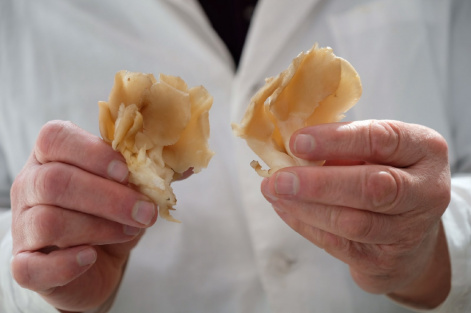Mushrooms may become part of the diet of astronauts on the lunar base
22 March 2022 г.

The development of a human life support system (LSS) is an integral part of future long-term space missions. One of the aims of LSS is to provide astronauts with food. Along with plants and animals, mushrooms are included in the list of biological species, which are candidates for the food reproduction.
Scientists from the Institute of Biophysics of the Federal Research Center "KSC SB RAS" together with colleagues from Austria developed a conceptual model of a mushroom farm on a lunar base. It consists of two modules. The first module is used to prepare and sterilize the substrate, while the second one is used for sowing and growing mushrooms. With an increase in the number of crew members, the production of mushrooms can be increased by installing additional modules.
According to the researchers, the most suitable mushroom to grow on the moon is oyster mushroom. It is low in sodium, saturated fat and cholesterol. At the same time, they are a good source of protein, thiamine, vitamin B6, folic acid, iron, magnesium, zinc and manganese, as well as dietary fiber, riboflavin, niacin, pantothenic acid, phosphorus, potassium and copper. Unlike other cultivated mushrooms, oyster mushroom has already been used in an experimental model of LSS for processing plant waste.
The technological cycle of growing mushrooms lasts a little more than two months and includes the preparation and sterilization of the substrate, sowing mushrooms, and harvesting. With the cycle completed, the used substrate is removed and the farm is wet cleaned. The researchers note that mushrooms are planned to be grown on the Moon on plant waste, for example, wheat, which was used in the BIOS-3 life support system created by Krasnoyarsk scientists. The scientists calculated that one technological cycle requires 86 kilograms of plant waste and yields 28 kilograms of fresh mushrooms. This amount of mushrooms is enough for fifteen cosmonauts to eat two meals a week containing 100 g of oyster mushrooms.
“There are several reasons for including mushrooms in the space diet. Unlike plants, mushrooms contain vitamin D as animal products. Therefore, if it is impossible to get animal food, they can become the only source of vitamin D in the ecological life support system. Mushrooms are grown on plant waste, which ensures their processing into fertilizer. The use of mushrooms increases the diversity of the space diet. However, the presented project of a mushroom farm contains uncertainties, because mushrooms have not yet been grown on the Moon. The parameters of the future mushroom farm and the lunar bioregenerative life support system can be refined with the help of their small counterparts delivered to the Moon,” said Vladimir Kovalev, Candidate of Biological Sciences, Senior Researcher at the Institute of Biophysics of FRC KSC SB RAS.
____________________________________________
Note that in 2021, Roscosmos and the China National Space Administration (CNSA) signed a memorandum on the creation of a station on the moon. "Roscosmos State Corporation and CNSA <...> will promote cooperation on the creation of an International Scientific Lunar Station with open access for all interested countries and international partners, with the aim of strengthening research cooperation and promoting the exploration and use of outer space for peaceful purposes in the interests of all mankind," stated the Russian state corporation.
Share:



